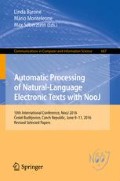Abstract
In this work, we take a linguistic knowledge approach to identify innovative language used to describe new entrepreneurial activity. Starting from the Theory of the Speech Acts, an innovative startup needs to express itself through an innovative language continuously upgraded, to describe processes and products. We use several levels of NooJ to process the type of knowledge presented in business documents to recognize new linguistic resources. This approach, based on Lexicon-Grammar (LG) framework, is extendible to every knowledge domain although we process business documents in Agri-food sector that more than others presents critical issues in knowledge management and representation. Regarding the results of our analysis with NooJ, we note that 10% of tokens retrieved are unknown words.
Access this chapter
Tax calculation will be finalised at checkout
Purchases are for personal use only
References
Graham, P.: Want to start a startup? (2012). http://www.paulgraham.com/growth.html
Robehmed, N.: What is a startup? (2013). http://www.forbes.com/sites/natalierobehmed/2013/12/16/what-is-a-startup/#57a38b894c63
Austin, J.L.: How to Do Things with Words. Oxford University Press, Oxford (1975)
Searle, J.R.: Speech Acts. An Essay in the Philosophy of Language. Cambridge University Press, Cambridge (1969)
Clancy, J.J.: The Invisible Powers. The Language of Business. Lexington Books, Lanham (1999)
Daniushina, Y.V.: Business linguistics and business discourse. Linguística de negócios e discurso de negócios. Calidoscópio 8(3), 241–247 (2010)
Studer, P.: Linguistics applied to business contexts: an interview with Patrick Studer. ReVEL 11(21), 187–202 (2013)
Ford, E.W., Wang, Z.: Tackling the confusing words of strategy. Effective use of key words for publication impact. Bus. Manag. Strategy 5(1) (2014)
Leontiades, M.: The confusing words of business policy. Acad. Manag. Rev. 7(1), 45–48 (1982)
Hoskisson, R.E., Hitt, M.A., Wan, W.P., Yiu, D.: Theory and research in strategic management. Swings of a pendulum. J. Manag. 25(3), 417–456 (1999)
Nicolai, A.T., Dautwiz, J.M.: Fuzziness in action what consequences has the linguistic ambiguity of the core competence concept for organizational usage? Br. J. Manag. 21, 874–888 (2010). doi:10.1111/j.1467-8551.2009.00662.x
Ronda-Pupo, G.A., Guerras-Martin, L.Á.: Dynamics of the evolution of the strategy concept 1962–2008: a co-word analysis. Strateg. Manag. J. 33, 162–188 (2012). doi:10.1002/smj.948
Mintzberg, H.: Patterns in strategy formation. Manage. Sci. 24(9), 934–948 (1978)
Silberztein, M.: NooJ Manual (2003). www.nooj4nlp.net
Silberztein, M.: Corpus linguistics and semantic desambiguation. In: Maiello, G., Pellegrino, R. (eds.) Database, Corpora, Insegnamenti Linguistici, pp. 397–410. Schena Editore/Alain Baudry et Cie, Fasano/Paris (2012)
Silberztein, M.: NooJ computational devices. In: Donabédian, A., Khurshudian, V., Silberztein, M. (eds.) Formalising Natural Languages with NooJ, pp. 1–13. Cambridge Scholars Publishing, Newcastle (2013)
Silberztein, M.: NooJ V4. In: Koeva, S., Mesfar, S., Silberztein, M. (eds.) Formalising Natural Languages with NooJ 2013, pp. 1–12. Cambridge Scholars Publishing, Newcastle (2013)
Silberztein, M.: Analyse et generation transformationnelle avec NooJ. In: Elia, A., Iacobini, C., Voghera, M. (eds.) Livelli di Analisi e Fenomeni di Interfaccia. Bulzoni, Rome (2015)
Silberztein, M.: La formalisation des langues: l’approche de NooJ. ISTE Ed., Londres (2015)
Ryan, C.D.: Innovation in Agri-food Clusters. Theory and Case Studies. CABI, Wallingford/Boston (2013)
Gross, M.: Méthodes en syntaxe. Régime des constructions complétives. Hermann, Paris (1975)
Gross, M.: Les bases empiriques de la notion de prédicat sémantique. Langages 15(63), 7–52 (1981). Larousse, Paris
Gross, M.: Lexicon-grammar. The representation of compound words. In: Proceeding of COLING 1986, pp. 1–6. University of Bonn, Bonn (1986)
Gross, M.: La construction de dictionnaires électroniques. Ann. Télécommun. 44(1–2), 4–19 (1989). CNET, Issy-les-Moulineaux/Lannion
Elia, A., Martinelli, M., D’Agostino, E.: Lessico e strutture sintattiche. Introduzione alla sintassi del verbo italiano. Liguori Editore, Napoli (1981)
Vietri, S.: Dizionari elettronici e grammatiche a stati finiti. Metodi di analisi formale della lingua italiana. Plectica, Salerno (2008)
Elia, A., Vietri, S.: Lexis-grammar and semantic web. INFOTEKA XI(1), 15–38 (2010)
Elia, A., Vietri, S., Postiglione, A., Monteleone, M., Marano, F.: Data mining modular software system. In: Arabnia, H.R., Marsh, A., Solo, A.M.G. (eds.) Proceedings of the 2010 International Conference on Semantic Web & Web Services, SWWS 2010, pp. 127–133. CSREA Press, Las Vegas (2010)
Elia, A., Postiglione, A., Monteleone, M., Monti, J.: CATALOGA®: a software for semantic and terminological information retrieval. In: Akerkar, R. (ed.) Proceedings of the International Conference on Web Intelligence, Mining and Semantics, WIMS 2011. ACM, New York (2011). Article 11
Elia, A.: On lexical, semantic and syntactic granularity of italian verbs. In: Kakoyianni Doa, F. (ed.) Penser le lexique-grammaire: perspectives actuelles, pp. 277–288. Editions Honoré Champion, Paris (2013)
Elia, A.: Operatori, argomenti e il sistema “LEG-Semantic RoleLabelling” dell’italiano. In Mirto, I. (ed.) Relazioni Irresistibili, pp. 105–118. ETS, Pisa (2014)
Elia, A., Monteleone, M., Esposito, F.: Dictionnaires électroniques et dictionnaires en ligne. Les Cahiers du Dictionnaire 6, 43–62 (2014)
Author information
Authors and Affiliations
Corresponding author
Editor information
Editors and Affiliations
Rights and permissions
Copyright information
© 2016 Springer International Publishing AG
About this paper
Cite this paper
Esposito, F., Elia, A. (2016). NooJ Local Grammars for Innovative Startup Language. In: Barone, L., Monteleone, M., Silberztein, M. (eds) Automatic Processing of Natural-Language Electronic Texts with NooJ. NooJ 2016. Communications in Computer and Information Science, vol 667. Springer, Cham. https://doi.org/10.1007/978-3-319-55002-2_6
Download citation
DOI: https://doi.org/10.1007/978-3-319-55002-2_6
Published:
Publisher Name: Springer, Cham
Print ISBN: 978-3-319-55001-5
Online ISBN: 978-3-319-55002-2
eBook Packages: Computer ScienceComputer Science (R0)

